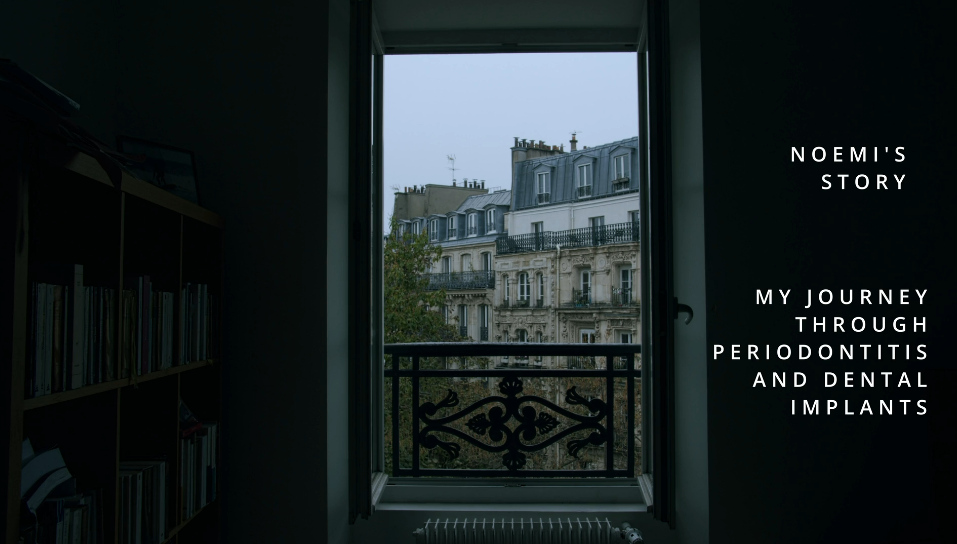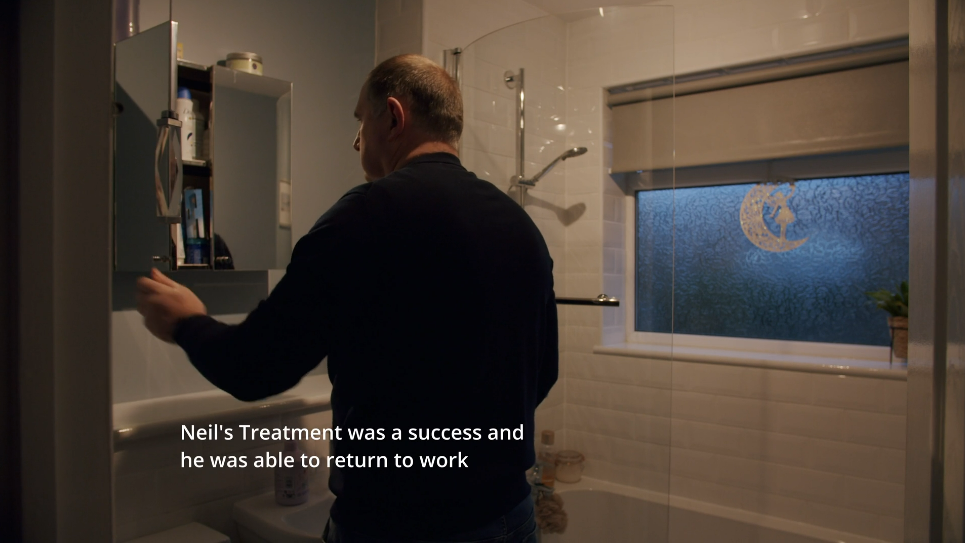Treatment, Article, EuroPerio
Two new films will help put patients centre stage at EuroPerio11
31 January 2025
Since EuroPerio8 a decade ago, where the groundbreaking documentary The Sound of Periodontitis was premiered, the perspective of patients has been a feature of the EFP’s triennial congress. EuroPerio11 in Vienna will include a symposium with patients on the stage and the first screenings of two new EFP-backed films focused on the experience of periodontal and implant treatment. Symposium moderators Ian Needleman and Corinna Bruckmann explain how increased patient involvement can enhance periodontal care.
Since The Sound of Periodontitis debuted at EuroPerio8 in London in 2015, how has the patient perspective evolved within the EFP and EuroPerio?
Ian Needleman: That symposium with patients in London in 2015 was a fantastic opportunity, and The Sound of Periodontitis had a very big impact and it continues to be used widely.
Since then, we have learned a lot about patient sessions at conferences. It's a lot to ask patients to expose their health condition to a professional audience at a large conference and to a wider public.
One thing we wanted to build on from EuroPerio8 was to make the whole session and the films more pan-European. We started over a year ago and established a working group with representation from Austria. Hungary, Lithuania, Spain, Israel, and the UK. This included five patients, two dental hygienists, three dental specialists (Corinna, me, and Daniel Veigh from Budapest who is both a prosthodontist and a patient advocate for diabetes), two postgraduate periodontology students, and the CEO of one of the most important patient advocacy organizations, the International Alliance of Patients’ Organizations (IAPO).
This working group has lots of different perspectives, and over this last year we have developed the format of the symposium.
Why did you decide to base the symposium around documentary films?
Ian Needleman: We always planned for films to be a central part of the symposium: they are a helpful way to bring the voices of people with lived experience into a conference, and they give us something very concrete to discuss.
And then there is legacy. This is what we found from EuroPerio8 with The Sound of Periodontitis. So, these two new films will be an important legacy from EuroPerio11.
Another learning from EuroPerio8 was that instead of one longer film, we should have two shorter ones with different—though closely related—themes. So, in Vienna we will have one patient’s journey through periodontitis and another patient’s journey through periodontitis and dental implants.
What is crucial is that the film’s key messages were developed by the working group, from the priorities of the people with lived experience.
What have you learned from the patients in the working group?
Corinna Bruckmann: Everyone in the medical field is talking about diversity, equity, and inclusion. But the idea of the patient with lived experience is totally unclear, especially for dentists.
There are patient-reported outcome measures (PROM)—a field where a lot of studies have been performed—and scientists are always very happy if they can study an outcome. But to report an outcome, you must first define it. And what I felt is that many patients don't see their experience, their feelings, their fears, and their pain being defined in a proper way, in the way that they experience them.
The lived experience is so valuable, but it is so hard to capture and make visible to professionals. Even patients I have treated for 10 or 15 years, in this working group they mentioned things for the first time.
What kind of things?
Corinna: Things that I, as a dentist, would never have thought about. Like how periodontitis would influence their daily business, their relation to their partners, the terrible fear of whether they could afford certain treatments, and the scheduling of the treatment.
Ian: The patients in the working group and in the films talk about just how big an impact periodontitis has had on their lives. And this is a really important element that goes along with the Economist Intelligence Unit white papers that the EFP has been engaged in, giving the message that periodontitis is not just about gums, that gum health has such a big impact on people's lives, wellbeing, and both physical and mental health. And I think that these films can contribute towards this.

Photograph courtesy of Media Trust
What are the key messages of the two films?
The working titles for the films are very similar—A Journey Through Periodontitis and A Journey Through Periodontitis and Dental Implants. The former features the lived experience of a British patient while the latter is in French, with English subtitles. One man, one woman. And it’s just the person speaking and showing various aspects of their lives and their daily activities. The documentary in French is based on a patient who has been involved with the working group and is very keen for her story to be heard, but who wished to remain anonymous. So, in the film she is played by an actor. But everything in the film has come from her, nothing has been fabricated.
The key messages are:
- The seriousness of periodontitis and its effect on people's lives. Many feel an overwhelming sense of shame and embarrassment about the condition.
- How diagnosis can be a difficult time but also a cathartic experience, because there is now a way forward to tackling this issue.
- How patients understand their need for specialist treatment and how they access it.
- The importance of supportive dentists and hygienists as positive coaches to help patients progress through this journey and to develop the discipline of self-care.
- Patients talk about how they coped with treatment, and they don't shy away from talking about how difficult a time it was.
- They also talk about self-exclusion from social groups, friends, and the effects on employment and how this has improved tremendously thanks to the positive effect of treatment.
- One key message is that prevention and early identification would avoid most of these issues.
- Another is that people who have a serious periodontal condition are really worried about making a start. It can be hard to get started, but the sooner you get started, the better the outcome will be.
I think one of the elements that comes out of the films is just how big a beneficial effect getting treatment has on people's lives. It's not just about a complex disease that's unpleasant and the treatment can be unpleasant, but also that treatment will make a big difference.

Photograph courtesy of Media Trust
Who is involved in the funding, production, and distribution of these films?
Ian: I think it's important to call out Lior Shapira (the scientific chair of EuroPerio11) because he invited us to put this symposium together. The EFP is really showing leadership here and both the EFP and EuroPerio have financially supported the production of these films, which is a significant outlay. This clearly demonstrates the EFP’s interest in developing patient involvement.
Apart from the films, what else does the symposium at EuroPerio11 involve?
Ian: Dani Mothci, the CEO of IAPO, will talk about increasing engagement with patients with their care across Europe. She's going to help us raise our level of ambition in terms of involving patients. I don't mean as subjects or participants in research, but collaboratively in developing guidelines, materials, all sorts of things. So that's going to be very helpful.
After each film there will be an opportunity for a brief discussion about it, and we'll then have a more general discussion with the panel of patients (all members of the working group), which will focus on what it's like to live with periodontitis and dental implants, and what dentists and dental hygienists should know about how patients feel and think about their condition and their treatment. And to conclude, there will be a 15-minute Q&A with the audience.
Corinna: A lot of young colleagues and postgraduate students come to EuroPerio to see the “masters of the universe” in periodontology.And it may seem to be about the last millimetre of recession coverage and another millimetre of clinical attachment level gain and regeneration. In reality, the periodontal community, including the EFP and industry, is trying to highlight the importance of periodontal health to peoples’ lives. It is the responsibility of all of us. As an international federation, we really must put the spotlight on patient-centred outcomes and not only on dentist-centred issues.
SYMPOSIUM: Patient involvement to enhance periodontal care: the patient's view. EuroPerio11 | Vienna | Thursday 15 May, 14.30-16.00
EuroPerio11 | Vienna | 14-17 May: Information and Registration




